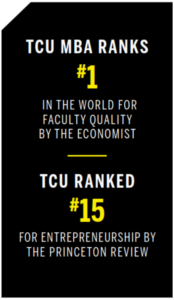TCU’S IDEAFACTORY: BRINGING DESIGN THINKING TO HIGHER EDUCATION
“There’s an old story of a university architect who waited until the students had worn paths in the grass before adding sidewalks to the campus, quite literally following their footsteps. That’s human-centered design: understanding how people behave and think, then create something with their choices in mind, not your own,” says Corey Landers, graduate of the Texas Christian University (TCU) Neeley School of Business and product designer at Argo Digital in New York City. “TCU has always been a campus focused on the student experience, and now it has the TCU IdeaFactory to empower students to utilize human-centered design in all disciplines.”

The TCU IdeaFactory — a unit of the School of Interdisciplinary Studies — supports the innovative ideas and creative spirits of TCU students and the entire TCU community by providing an environment, frameworks and resources to advance new ideas and drive creative solutions. The program supports ideas from initial concept to prototype or beyond, by offering mentorships, resources and building teams of university faculty and community members.
Students in TCU’s IdeaFactory are encouraged to solve problems by following the five stages of design thinking (empathizing, defining, ideation, prototyping and testing). In that method, faculty and coaches walk students through the entire process of creating and launching a new product. From conducting market research to prototyping and testing to finally preparing for a venture capital pitch competition, the TCU IdeaFactory team is focused on encouraging innovation
and entrepreneurship.
“Higher education is not checking off a series of boxes to get a degree, but it’s actually lining up or stacking a set of boxes to reach new heights or new places,” founding IdeaFactory director Eric Simanek says in a TCU 360 article.
Borrowing Simanek’s analogy, the IdeaFactory is open to students from across the TCU campus, encouraging them to use their powers of critical thinking so they can stack their sets of boxes to be more prepared for constantly evolving careers.
This article is part of the 2020 Higher Education Review Magazine.